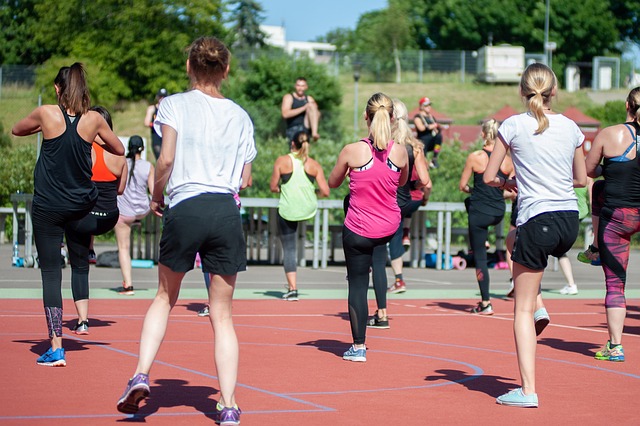The Proof: Scientific Benefits of Exercise
You’ve heard it from your fitness-junkie friends, you’ve heard it on the TV, and you’ll hear it from me – exercise is good for you. There are numerous ways in which exercise improves your health, mood, and even social life, but let’s start with the science of it all. All benefits of exercise have a series of hormonal, mental, and physical shifts behind them. Exercise fights off numerous illnesses, boosts your happy hormone production, and teaches you discipline.
Exercise does not need to be a strenuous daily grind. It is not all about running a marathon and then some, and it is definitely not meant to resemble strongman competitions. On the contrary, exercising should be enjoyable and include a level of effort you’re able to give at that particular time. For beginners, that may be a light jog or a dance class, and for more advanced exercisers, that could look like a sweat-fest in the gym. One thing is certain – regular activity is a way to improve your daily (and nightly) life.
5+ Health Benefits of Exercise
Often, you’ll hear that people exercise when they want to lose weight. While exercise does help with that, the number on the scale should not be your primary motivator. By all means, if it gets you going, that’s great, but the health benefits of exercise should be your primary concern.
Exercising regularly has a positive impact on the following:
- Cardiovascular health. You may think you’re invincible now, but as life goes on and the body suffers regular wear and tear, it becomes more important than ever to protect your heart and lungs. People who exercise regularly have a lower resting heart rate, which prevents several diseases.
- Reduced blood pressure. With the way we live, stress is an inevitable part of life. Sometimes you might get an email and see red instantly, followed by a ringing in your ears. While you cannot prevent such situations, exercising regularly helps keep your blood pressure at normal levels for most of the day.
- Improved immune function. It sucks being sick, and working out fights off those nasty infections!
- Insulin control. With hectic lifestyles come some questionable food choices, including processed sugar. The more of it you have, the more insulin resistance you build, which can result in diabetes. Doing sports on a regular basis keeps hormone production in check.
- Better blood flow and lung function. Introducing cardio into your life builds your lung capacity and promotes better blood flow and oxygen delivery.
In addition, exercise helps reduce inflammation, promotes better sleep, and fosters healthy joint movement.

The Mighty Mental Benefits of Exercise
While mental health is part of overall health, it doesn’t mean it is not affected by your lifestyle and habits. How you move can have an impact on how you feel.
Some of the most important mental health benefits of exercise include:
- Reduced stress and anxiety. Exercise regulates the stress hormone cortisol, which is responsible for those jittery, antsy feelings you get sometimes. Life is stressful for everyone, whether you’re working or studying, but you can always find 30 minutes in your day to move in a way that feels good.
- Cognitive decline prevention. Yes, that’s right, working out regularly can prevent Alzheimer’s disease, and it doesn’t even have to be that hard – some swimming will do … well, swimmingly! Additionally, fitness gives you a brain boost, helps you focus, and keeps brain fog at bay.
- Increased self-confidence. This is a multi-faceted one. When you exercise, you’ll feel a sense of accomplishment – keep at it because this will seep into your self-esteem. On the other hand, regular exercise has benefits for looks, too – you can see changes after as little as two weeks, and you’ll feel great once you do!
- Better memory. Busting a move increases the size of your hippocampus, which is responsible for retaining information. And who doesn’t want to be able to study less and remember more? And who knew it was as easy as breaking a sweat?
- Creativity boost. Exercise, combined with a hot shower after, can boost your creativity for several hours. No wonder I get my best work done in the morning after a hard-hitting session. When you exercise, you’re in tune with your body and mind; as a result, information flow is facilitated, and you may find you’re getting some of your best ideas while working out.
There are also some indications that exercise helps with depression, controlling addiction, and productivity. If you’re still not sure about the benefits of exercise, keep reading!
Get Socialising: The Social Benefits of Exercise
When I talk about exercise, I don’t only mean solitary gym sessions. A football game with friends counts, as does a hiking trip where you spend time exchanging the latest gossip. Playing Just Dance with your roomie, walking your dog, taking a yoga class – whatever gets your heart rate up is exercise! Working out with friends has its own set of advantages:
- Higher motivation. When you’re lounging on your couch and the only person you owe accountability to is yourself, it can be pretty easy to find an excuse not to exercise. However, when you’re doing something with friends, you keep each other in check and encourage progress and discipline.
- Improved relationships. Nothing strengthens a bond between friends more than seeing your BFF roll off a gym ball for the third time. Healthy laughter and health-motivated exercise bring you together, as does the time you share talking, exchanging judgemental looks (admit it, you do it too), and nodding encouragingly at one another.
- Increased community engagement. When you join a sports class, you will come in contact with people you otherwise wouldn’t have met. You can develop new friendships just about anywhere, and these new faces may change your life.
- Better teamwork skills. When you play a game of team sport like volleyball or relay racing, you have to know how to work in a team. Coincidentally, it’s one of those transferrable skills that your employers will love, too 😉.
As you build new friendships, you’ll also find that exercise boosts the energy needed for socialisation. Keeping each other going can positively contribute to emotional regulation, respect for your peers, and better communication skills.

Let’s Not Forget the Physical Benefits of Exercise
While I did say that you should focus more on the health benefits of exercise, I’m not going to deny that it has its perks for your appearance. It is a sad fact that people have less and less time for physical activity these days. Work is mostly sedentary, you can’t exactly study while jogging around, and, at the end of the day, you’re too tired to be active.
Weight control is one of the most important benefits of exercise. And not because of your appearance – this is to do with the side effects of being overweight. We all gain a few pounds here and there, and there is no magical number for a healthy weight that fits us all. In fact, there is no number at all – each person has a healthy range within which their weight should fall, fostered by a healthy lifestyle. This means around 30 minutes of cardiovascular exercise per day and following a relatively healthy diet.
Maintaining a healthy weight keeps various cardiovascular and musculoskeletal diseases at bay. It reduces the stress on your joints, promotes better gut health, and, in a feedback loop, makes it easier to move and exercise. While you can lose weight by dieting alone, most of the time, that weight loss is difficult to maintain long-term. Moderate diet modification and exercise are a much more sustainable way to go. Not to mention that seeing physical changes is incredibly motivating and does wonders for your self-esteem.
Introducing Exercise into Your Life (to Save Your Life!)
I get it; life is busy, and finding the motivation to exercise can be challenging. However, this doesn’t mean that it’s impossible. Here are a few tips on introducing exercise into your life (from a former non-exerciser):
- Change your mindset. It’s not all or nothing – it’s a little bit every day. If you tell yourself you have to get up at 5am and run 10k every morning, you’ll be even less inclined to do anything. Instead, set aside about 30 minutes for physical activity and work your way into it. Some days you’ll feel stronger and want to do a bit more; others, you may find that 30 is quite enough. Be gentle with yourself.
- Find an exercise that works for you. There is no reason why exercise shouldn’t be enjoyable for all fitness levels. Listen to your body and move in a way that feels good.
- Select a space for your workouts. Be that a gym, sports hall, or your living room – every place has its potential, and once you associate it with exercise, you’ll find it easier to get going.
- Make the time and keep yourself accountable. The time you spend scrolling on social media before bed could be turned into a quick sweat session. You can exercise while watching your favourite show or listening to an audiobook. 15 minutes a day of moderate exercise is enough for the health benefits. If you can fit 30 minutes in your daily life, even better.
- Pick a time when you can’t find excuses. Some people like to exercise in the morning – it’s the first thing you do, and then you don’t have to think about it anymore. Others prefer afternoons and evenings after they’ve had a good meal. The most important thing is to find the time that won’t give you a chance to come up with reasons not to work out.
- Choose a trainer. I personally owe all my fitness to FitnessBlender. They have an immense library of free workouts for every fitness level, great recipes, expert articles, and a super supportive community. You might prefer a personal trainer or someone leading your spin class. If you need help, don’t be shy about asking for it.
- Just start moving. Believe it or not, sometimes all it takes is getting up and just doing it (Shia LeBeouf style). Start jogging in place, hit the road for a walk or a spin on your bicycle, or go to that after-work yoga meeting. Your body will register the benefits even faster than your mind, and before you know it, you’ll be more than halfway done!
Keep yourself in check, listen to your body, and keep moving; you’ll see the benefits.
The Many, Many Benefits of Exercise
Despite the popular misconception, exercise is not just for your looks. Starting and keeping a healthy exercise habit is a great way to improve your physical, mental, and social health.
Among the many benefits of exercise, you’ll find these crucial:
- Improved cardiovascular health.
- Reduced cognitive decline.
- Boosted immune system.
- Better soft skills and a sense of belonging.
- Increased self-esteem.
Hit the ground running – you’ll be surprised at the self you’ll run into at the end! 😊












